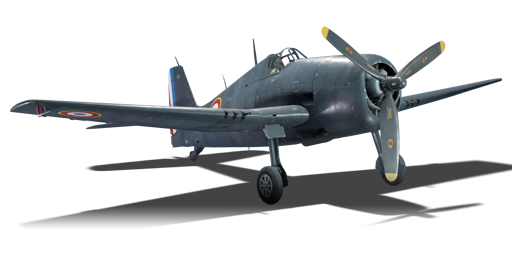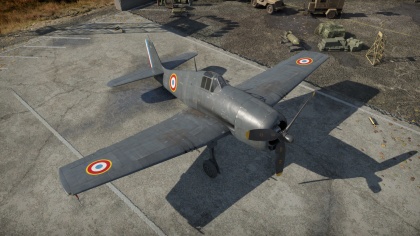F6F-5 (France)
Contents
| This page is about the aircraft F6F-5 (France). For other uses, see F6F (Disambiguation) |
Description
The F6F-5 Hellcat is a Rank III France naval fighter
with a battle rating of (AB), (RB), and (SB). It was introduced in Update 1.73 "Vive la France"
General info
Flight Performance
| Characteristics | |||||||
|---|---|---|---|---|---|---|---|
| Stock | |||||||
| Max Speed (km/h at ?,000 m) |
Max altitude (meters) |
Turn time (seconds) |
Rate of climb (meters/second) |
Take-off run (meters) | |||
| AB | RB | AB | RB | AB | RB | ||
| ? | ? | ?,000 | ??.? | ??.? | ??.? | ??.? | ??? |
| Upgraded | |||||||
| Max Speed (km/h at ?,000 m) |
Max altitude (meters) | Turn time (seconds) | Rate of climb (meters/second) |
Take-off run (meters) | |||
| AB | RB | AB | RB | AB | RB | ||
| ? | ? | ?,000 | ??.? | ??.? | ?.? | ?.? | ? |
Details
| Features | ||||
|---|---|---|---|---|
| Combat flap | Take-off flap | Landing flap | Air brakes | Arrestor gear |
| X | X | X | X | X |
| Limits | ||||
|---|---|---|---|---|
| Wing-break speed (km/h) |
Gear limit (km/h) |
Combat flap (km/h) |
Max Static G | |
| + | - | |||
| ??? | ??? | ??? | ~?? | ~? |
| Optimal velocities | |||
|---|---|---|---|
| Ailerons (km/h) |
Rudder (km/h) |
Elevators (km/h) |
Radiator (km/h) |
| < ??? | < ??? | < ??? | > ??? |
| Compressor (RB/SB) | ||
|---|---|---|
| Setting 1 | ||
| Optimal altitude | 100% Engine power | WEP Engine power |
| ?,??? m | ??? hp | ?,??? hp |
General info
Flight Performance
Describe how the aircraft behaves in the air. Maximum speed, maneuverability, speed and allowable loads - these are the most important characteristics of the vehicle.
Survivability and armour
- 38 mm Bulletproof glass in front of the pilot
- 6.35 mm Steel plates behind the pilot
- 3 mm Steel plates on fuselage top in front of the cockpit
- 3 mm Steel plate on the top front of oil cooling system
- 3 mm Steel plates on the bottom of the engine
Armaments
Offensive armament
The F6F-5 (France) is armed with:
- 6 x 12.7 mm Browning M2 machine gun (400 RPG = 2400 total)
The six machine guns are arranged in bundles of three mounted in both wings. Each is armed with the same amount of ammunition, which means that all guns will fire with each other until empty.
Suspended armament
The F6F-5 (France) can be outfitted with the following ordinance:
- Without load
- 6 x HVAR rockets
- 2 x Tiny Tim rockets
- 2 x 1000 lbs AN-M65A1 bombs
- 6 x HVAR rockets + 2 x 1000 lb AN-M65A1 bombs
- 1 x 2,216 lb Mk.13/44 torpedo
Usage in the battles
The key to both surviving and owning in the F6F is to keep your speed up and try to be even marginally higher than your opponents. Below 300 km/h (186 mph) it is very sluggish. As with most American fighters, Boom & Zoom is the preferred combat mode for the Hellcat, while it's average high-speed maneuverability can be used to add in a high yo-yo. It has a lot of ammo, but a good aim is still important since boom-n-zoom only allows you a small window of opportunity to hit your target before you have to climb back to altitude. Still, this is an excellent plane to practice your aim and tactics with because it's more forgiving than most boom-n-zoom fighters. If you don't have a particularly good aim, a good tactic is to open up at 500 m (0.31 mi), starting with your aim on the aircraft, and then slowly move your aim in front of the target. You won't require as much lead when diving on your target at 600+ km/h (+373 mph).
With dual 1,000-pound bombs and six HVAR rockets armed, the Hellcat is a stable game-ending platform in a pinch when the rest of your team is not ground-attacking. The two Tiny Tim Anti-tank rockets can also be useful for taking out more massive targets. Sometimes, it is useful to save the Cat as your last plane just for that. You can always jettison the rockets and bombs if you're suddenly forced to dogfight.
It is incredibly important to use Manual Engine Controls while piloting the Hellcat in Realistic or Simulator Battles. The Hellcat has access to three Supercharger gears, each tailored for a different altitude, and each will significantly improve your performance at their appropriate altitudes.
Keep in mind:
- It has a lot of engine power, but at anywhere between 5.7 and 7 tonnes, getting up to altitude isn't very easy.
- Resist the temptation to get into low-altitude turning fights. This is a heavy aircraft and it will lose a massive amount of speed in turns.
- While it has plenty of explosive armament options, in Realistic and Simulator battles the added weight and drag will usually make you an easy target for other fighters. Since most air battles are basically dogfights, you're often better off without the extra weight.
- This thing will perform reasonably well at low altitudes, but it's still recommended to stay at an altitude of 3 km or higher.
Manual Engine Control
| MEC elements | ||||||
|---|---|---|---|---|---|---|
| Mixer | Pitch | Radiator | Supercharger | Turbocharger | ||
| Oil | Water | Type | ||||
| Not controllable | Controllable Automatic pitch |
Controllable | Not controllable | Combined | Controllable | Not controllable |
Modules
| Tier | Flight performance | Survivability | Weaponry |
|---|---|---|---|
| I | |||
| II | |||
| III | |||
| IV |
Pros and cons
Pros:
- Can carry a lot of payload for a Rank II aircraft
- One of the few fighters that can carry a torpedo
- Very effective in either air-to-air or air-to-ground, very versatile
- Bombs are mounted directly under the fuselage, very accurate when dive bombing
- Good climb rate
- Excellent dive rate
- Good cockpit visibility
- Extremely efficient cooling system
- Lots of ammo
- Cheap repair cost
- Can take some hits
- Decent at energy fighting, although not as good as the Bf 109 F-4
Cons:
- You have to fly at a very low altitude at a deficient speed to drop the torpedo, which is impractical
- Only three salvos of HVAR rockets
- Carrying the 2 x 1000 lb bombs and the 6 x HVAR rockets also add a worse climb rate
- Slower top speed compared to other contemporary US fighters
- Higher stall speed than it's Japanese counterparts
- Control stiffening above moderate speeds
- Poor roll rate
- Large fuselage cross-section makes it an easy target
- Guns mounted further on the wings making it harder to aim at a target that is smaller than you
- Despite its formidable reputation as the Zero killer, a Zero could still easily kill it if you are forced to fight on the Zero's terms
History
Describe the history of the creation and combat usage of the aircraft in more detail than in the introduction. If the historical reference turns out to be too big, take it to a separate article, taking a link to an article about the vehicle and adding a block "/ historical reference" (example: https://wiki.warthunder.com/Name-vehicles/historical reference) and add a link to it here using the main template. Be sure to include links to sources at the end of the article.
Media
An excellent addition to the article will be video guides, as well as screenshots from the game and photos.
Read also
Links to the articles on the War Thunder Wiki that you think will be useful for the reader, for example,
- reference to the series of the aircraft;
- links to approximate analogues of other nations and research trees.
ETC.
Sources
Paste links to sources and external resources, such as:
- topic on the official game forum;
- page on aircraft encyclopedia;
- other literature.
| France fighters | |
|---|---|
| Dewoitine | D.371 · D.371 H.S.9 · D.373 · D.500 · D.501 · Pallier's D.510 · D.520 |
| Morane-Saulnier | M.S.405C1 · M.S.406C1 · M.S.410 |
| Arsenal | V.G.33C-1 |
| Bloch | M.B.152C1 · M.B.157 |
| Caudron | C.R.714 |
| Sud-Ouest | S.O.8000 Narval |
| American | H-75A-1 · H-75A-4 · ▄P-39Q-25 · ▄P-40F-5 Lafayette · ▄P-47D-22-RE · ▄P-63C-5 · F-6C-10-NA |
| ▄F6F-5 · ▄F6F-5N · F4U-7 · ▄F8F-1B | |
| Other countries | ▄Seafire LF Mk.III · ▄Yak-3 · Challe's ▄Yak-9T · NC.900 |
| Belgium | ▄Gladiator Mk I · ▄Spitfire FR Mk XIVe |
| Netherlands | ◘Sea Fury FB 51 |





